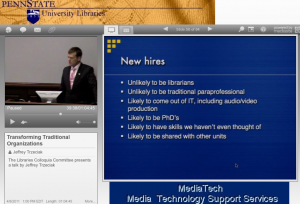Several weeks ago, McMaster University Librarian Jeff Trzeciak caused a disturbance in the force by some of his comments during a presentation at Penn State University. There was an fervent response across the academic and library-focused blogosphere, and the discussions spiraling out from this incident are still being actively pursued.
The point of contention that has been taken up, especially in the library community, comes from one slide in his presentation that states – “New Hires in the library will be unlikely to be librarians, likely to come out of IT, likely to hold PhD’s and be shared with other units,” among other things. Approaching this from the perspective of digital humanities, lauding the multi-skilled, scholar-technologist in an alt-ac professional track, this seems to be far from inflammatory. In fact, this seems like something the DH community could really get behind with a resounding “we’ve been saying/doing this for years.”
Aside from the many productive (and many other unproductive) responses to his claim, Mr. Trzeciak responded in a blog post of his own, and offered context with an additional point that deserves further exploration. He states,
One of the big issues not addressed directly in the video but was raised earlier in the day was the need to transform library science education. My comments in the video are directed at what I perceive to be a need to change how we train librarians. The world has changed dramatically and will continue to change even more dramatically. Library science education must keep pace.
Again, reading this from a DH point of view, there might be a sense of agreement that LIS education and other related fields need generous adaptation to accurately prepare information professionals for the next library.
In light of all this, I propose a Readathon session to try to unpack some of the major issues surrounding this talk, and the subsequent firestorm of responses to it. How and where does the DH community fit in here? Is the future of (academic) librarianship tied directly to digital humanities-based skills? What is the relationship between (academic) libraries and digital humanities? What of hiring practices in public and special libraries? How must library school be hacked to account for the rapid evolution of a profession that seems to be always playing catchup?
John Dupuis has compiled a comprehensive reading list on “McMastergate” including the public Google Doc I started to encourage and open discussion.
UPDATE: Almost immediately after I published this, Library Journal published this piece, a follow-up to a recent symposium they sponsored on The Future of Academic Librarianship. My response to this piece is here.




3 comments
amy
May 25, 2011 at 12:02 am (UTC -5) Link to this comment
rock. as an “instigator” of some of the chat around this topic, i am hella looking forward to this. lemme know if i can help!
Amanda French
May 25, 2011 at 11:59 pm (UTC -5) Link to this comment
Ooh. As a former CLIR fellow, I’m totally in. (I will say that in my limited experience with my “Readathon” brainchild, no one does the reading beforehand, but if we can spend part of the session reading and/or building a Zotero group or something for further reading, that’d be great.)
It’s interesting that these conversations continue to happen. Back when we first started the CLIR postdoc in 2004, there were similar calls to reform library education and to bring in people with PhDs and IT experience, and similar protests on the part of MLIS librarians. I can find links to those, as well.
I have to say that I’ve never quite understood why having PhDs in the library would contribute to the “next library” phase: IT, sure, but not so much PhDs. And when I worked at NCSU and Emory libraries, I didn’t see any notable lack of subject knowledge.
Anyway, I’d love to learn more about this incident and to weigh in.
Brian Croxall
May 31, 2011 at 3:47 pm (UTC -5) Link to this comment
As a fellow CLIR fellow, I too have followed this incident with interest. And I think it’s telling that from my own anecdotal experience, most of my DH people on Twitter weren’t talking about the talk. Instead, it was librarians.
Perhaps I could pull my Emory DiSC colleagues, Miriam Posner and Stewart Varner into this conversation to talk more about some about how we might integrate librarians into DH. That’s what we (more them than me) have been working on for the last year.
And for a very librarian-centered view on where things are going for librarians, I’d also point to this white paper produced by some of our subject librarians on The Futures of Subject Librarians.